Analyzing Employer Rights to Restrict Employee Social Media Posts
VerifiedAdded on 2023/06/11
|7
|1823
|92
Essay
AI Summary
This essay examines the legal complexities surrounding an employer's right to restrict an employee's social media posts, particularly focusing on the intersection of First Amendment rights and employer policies. It delves into cases like Costco Wholesale Corporation and Grutzmacher and Buker v. Howard County, highlighting the varying legal interpretations regarding employee speech and employer control. The analysis differentiates between government agencies and private employers, emphasizing the importance of balancing employee rights with the need to maintain public trust and prevent the dissemination of sensitive information. Ultimately, the essay argues against legislative intervention in social media regulation, advocating for stakeholder agreements to filter content while safeguarding freedom of expression, and concludes by stressing the need for both employers and employees to understand their rights and responsibilities under the Constitution and the National Labor Relations Act.
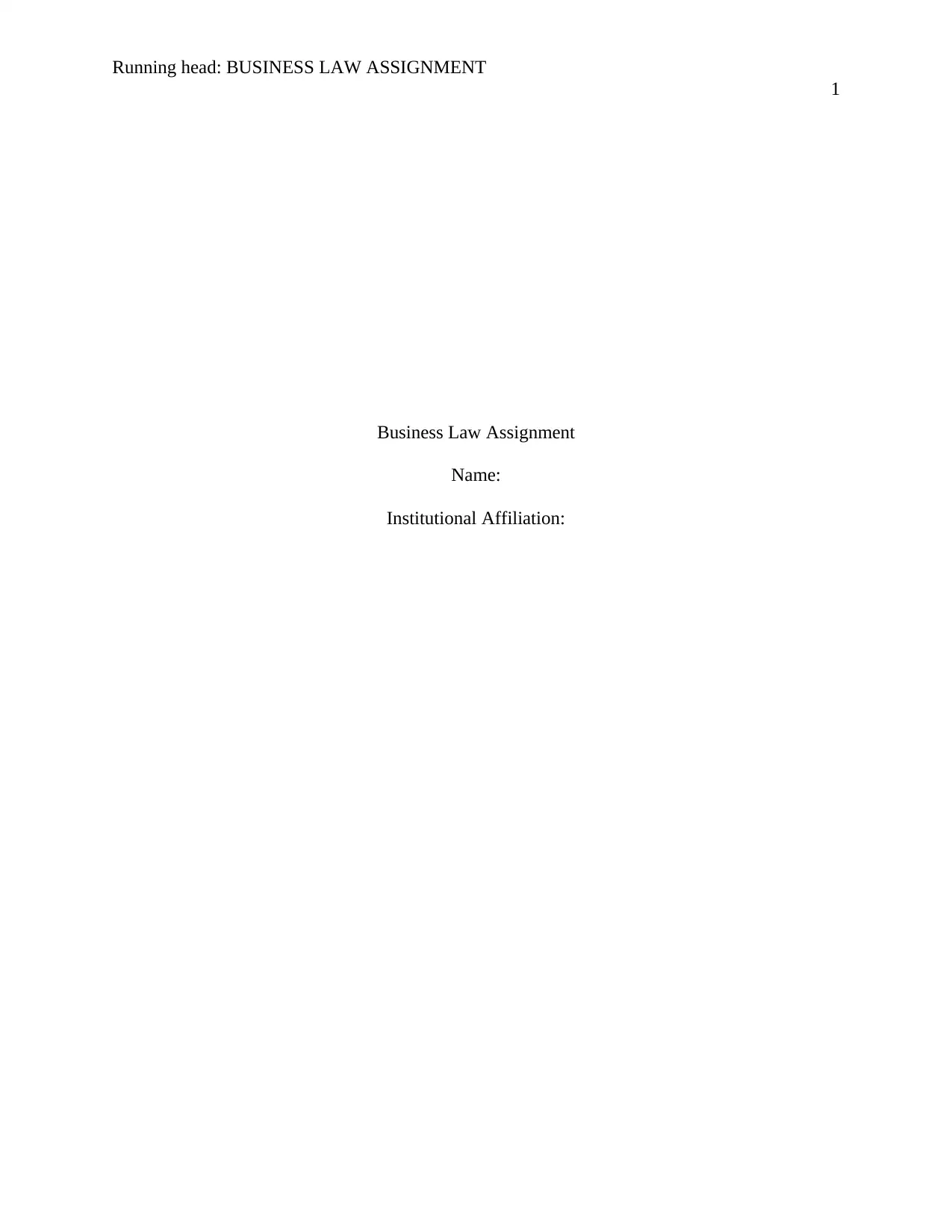
Running head: BUSINESS LAW ASSIGNMENT
1
Business Law Assignment
Name:
Institutional Affiliation:
1
Business Law Assignment
Name:
Institutional Affiliation:
Paraphrase This Document
Need a fresh take? Get an instant paraphrase of this document with our AI Paraphraser
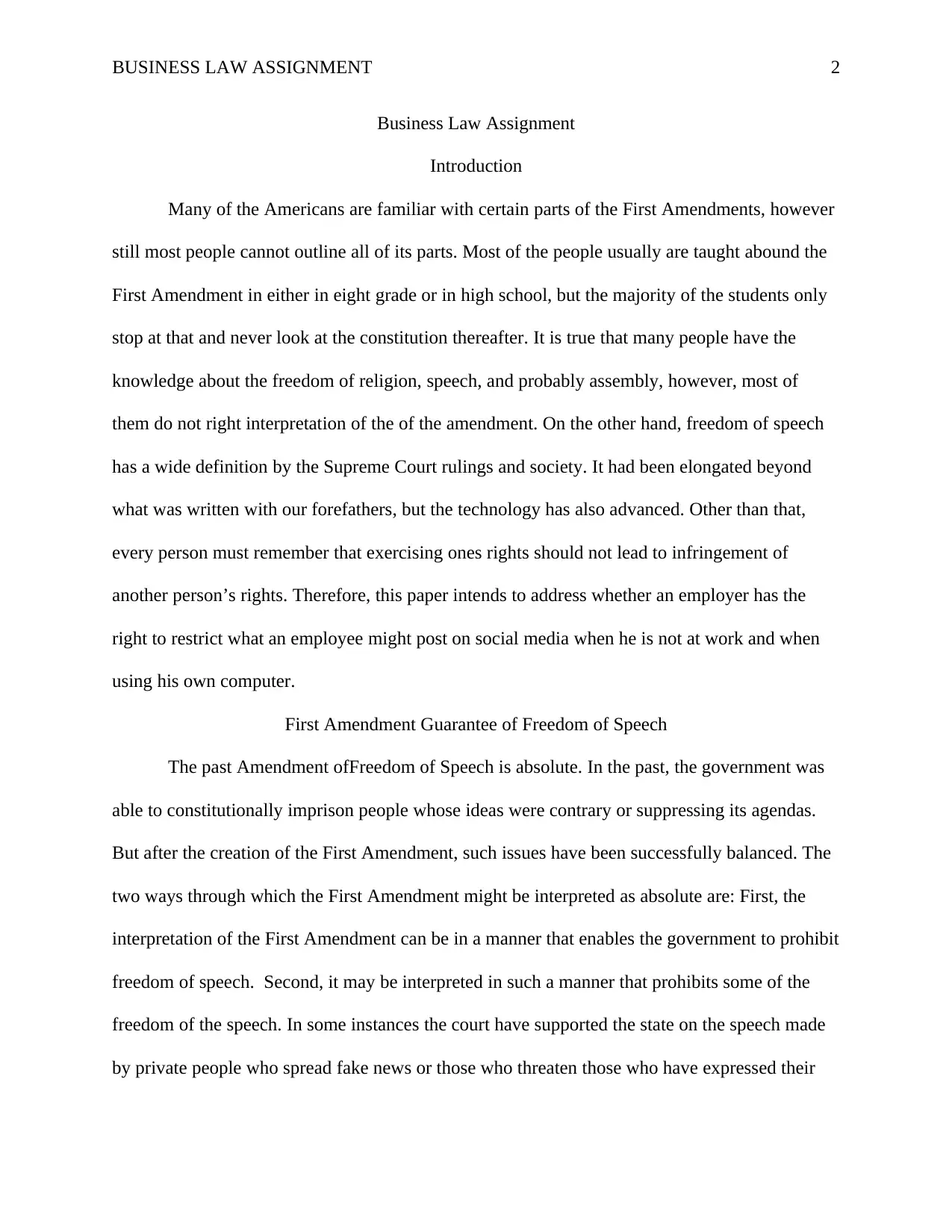
BUSINESS LAW ASSIGNMENT 2
Business Law Assignment
Introduction
Many of the Americans are familiar with certain parts of the First Amendments, however
still most people cannot outline all of its parts. Most of the people usually are taught abound the
First Amendment in either in eight grade or in high school, but the majority of the students only
stop at that and never look at the constitution thereafter. It is true that many people have the
knowledge about the freedom of religion, speech, and probably assembly, however, most of
them do not right interpretation of the of the amendment. On the other hand, freedom of speech
has a wide definition by the Supreme Court rulings and society. It had been elongated beyond
what was written with our forefathers, but the technology has also advanced. Other than that,
every person must remember that exercising ones rights should not lead to infringement of
another person’s rights. Therefore, this paper intends to address whether an employer has the
right to restrict what an employee might post on social media when he is not at work and when
using his own computer.
First Amendment Guarantee of Freedom of Speech
The past Amendment ofFreedom of Speech is absolute. In the past, the government was
able to constitutionally imprison people whose ideas were contrary or suppressing its agendas.
But after the creation of the First Amendment, such issues have been successfully balanced. The
two ways through which the First Amendment might be interpreted as absolute are: First, the
interpretation of the First Amendment can be in a manner that enables the government to prohibit
freedom of speech. Second, it may be interpreted in such a manner that prohibits some of the
freedom of the speech. In some instances the court have supported the state on the speech made
by private people who spread fake news or those who threaten those who have expressed their
Business Law Assignment
Introduction
Many of the Americans are familiar with certain parts of the First Amendments, however
still most people cannot outline all of its parts. Most of the people usually are taught abound the
First Amendment in either in eight grade or in high school, but the majority of the students only
stop at that and never look at the constitution thereafter. It is true that many people have the
knowledge about the freedom of religion, speech, and probably assembly, however, most of
them do not right interpretation of the of the amendment. On the other hand, freedom of speech
has a wide definition by the Supreme Court rulings and society. It had been elongated beyond
what was written with our forefathers, but the technology has also advanced. Other than that,
every person must remember that exercising ones rights should not lead to infringement of
another person’s rights. Therefore, this paper intends to address whether an employer has the
right to restrict what an employee might post on social media when he is not at work and when
using his own computer.
First Amendment Guarantee of Freedom of Speech
The past Amendment ofFreedom of Speech is absolute. In the past, the government was
able to constitutionally imprison people whose ideas were contrary or suppressing its agendas.
But after the creation of the First Amendment, such issues have been successfully balanced. The
two ways through which the First Amendment might be interpreted as absolute are: First, the
interpretation of the First Amendment can be in a manner that enables the government to prohibit
freedom of speech. Second, it may be interpreted in such a manner that prohibits some of the
freedom of the speech. In some instances the court have supported the state on the speech made
by private people who spread fake news or those who threaten those who have expressed their
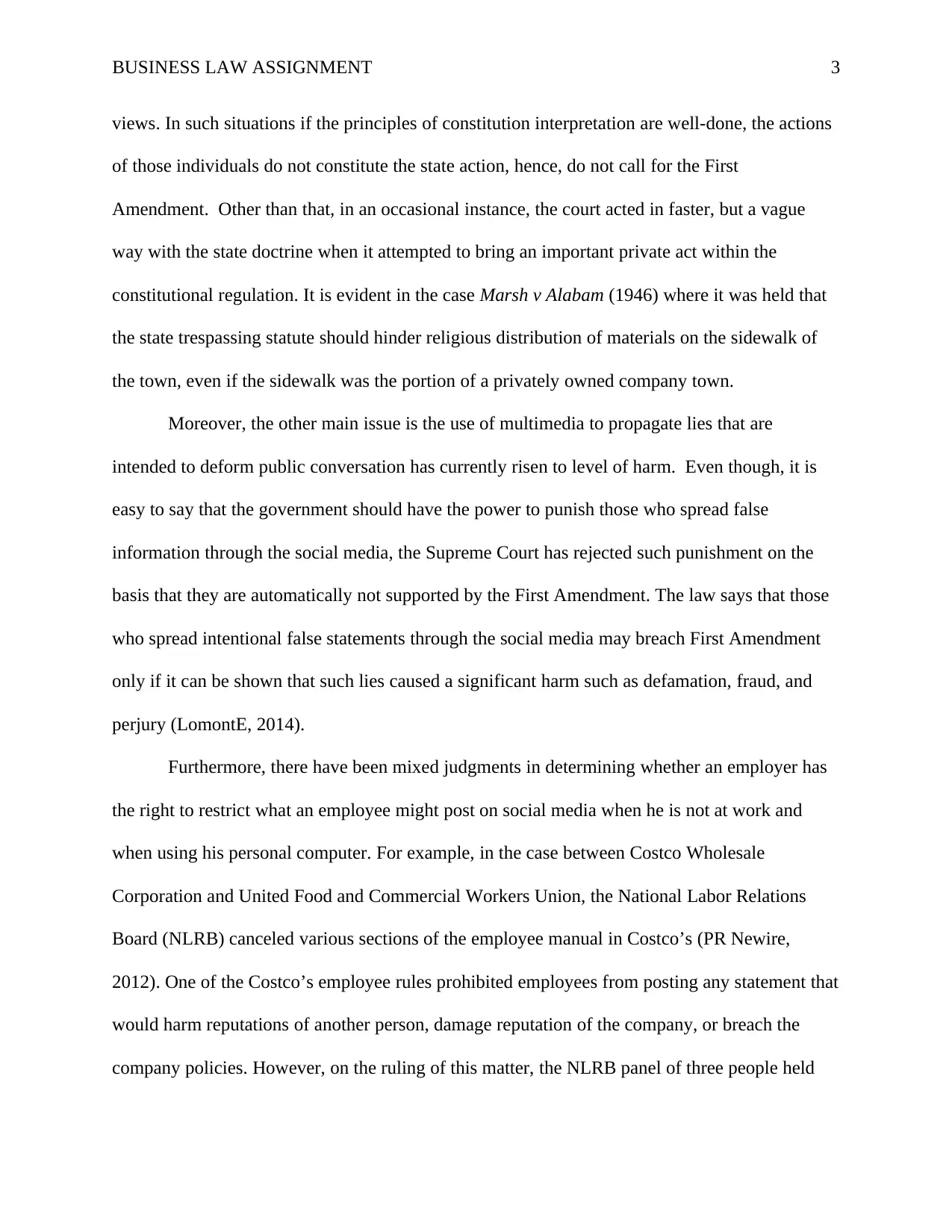
BUSINESS LAW ASSIGNMENT 3
views. In such situations if the principles of constitution interpretation are well-done, the actions
of those individuals do not constitute the state action, hence, do not call for the First
Amendment. Other than that, in an occasional instance, the court acted in faster, but a vague
way with the state doctrine when it attempted to bring an important private act within the
constitutional regulation. It is evident in the case Marsh v Alabam (1946) where it was held that
the state trespassing statute should hinder religious distribution of materials on the sidewalk of
the town, even if the sidewalk was the portion of a privately owned company town.
Moreover, the other main issue is the use of multimedia to propagate lies that are
intended to deform public conversation has currently risen to level of harm. Even though, it is
easy to say that the government should have the power to punish those who spread false
information through the social media, the Supreme Court has rejected such punishment on the
basis that they are automatically not supported by the First Amendment. The law says that those
who spread intentional false statements through the social media may breach First Amendment
only if it can be shown that such lies caused a significant harm such as defamation, fraud, and
perjury (LomontE, 2014).
Furthermore, there have been mixed judgments in determining whether an employer has
the right to restrict what an employee might post on social media when he is not at work and
when using his personal computer. For example, in the case between Costco Wholesale
Corporation and United Food and Commercial Workers Union, the National Labor Relations
Board (NLRB) canceled various sections of the employee manual in Costco’s (PR Newire,
2012). One of the Costco’s employee rules prohibited employees from posting any statement that
would harm reputations of another person, damage reputation of the company, or breach the
company policies. However, on the ruling of this matter, the NLRB panel of three people held
views. In such situations if the principles of constitution interpretation are well-done, the actions
of those individuals do not constitute the state action, hence, do not call for the First
Amendment. Other than that, in an occasional instance, the court acted in faster, but a vague
way with the state doctrine when it attempted to bring an important private act within the
constitutional regulation. It is evident in the case Marsh v Alabam (1946) where it was held that
the state trespassing statute should hinder religious distribution of materials on the sidewalk of
the town, even if the sidewalk was the portion of a privately owned company town.
Moreover, the other main issue is the use of multimedia to propagate lies that are
intended to deform public conversation has currently risen to level of harm. Even though, it is
easy to say that the government should have the power to punish those who spread false
information through the social media, the Supreme Court has rejected such punishment on the
basis that they are automatically not supported by the First Amendment. The law says that those
who spread intentional false statements through the social media may breach First Amendment
only if it can be shown that such lies caused a significant harm such as defamation, fraud, and
perjury (LomontE, 2014).
Furthermore, there have been mixed judgments in determining whether an employer has
the right to restrict what an employee might post on social media when he is not at work and
when using his personal computer. For example, in the case between Costco Wholesale
Corporation and United Food and Commercial Workers Union, the National Labor Relations
Board (NLRB) canceled various sections of the employee manual in Costco’s (PR Newire,
2012). One of the Costco’s employee rules prohibited employees from posting any statement that
would harm reputations of another person, damage reputation of the company, or breach the
company policies. However, on the ruling of this matter, the NLRB panel of three people held
⊘ This is a preview!⊘
Do you want full access?
Subscribe today to unlock all pages.

Trusted by 1+ million students worldwide
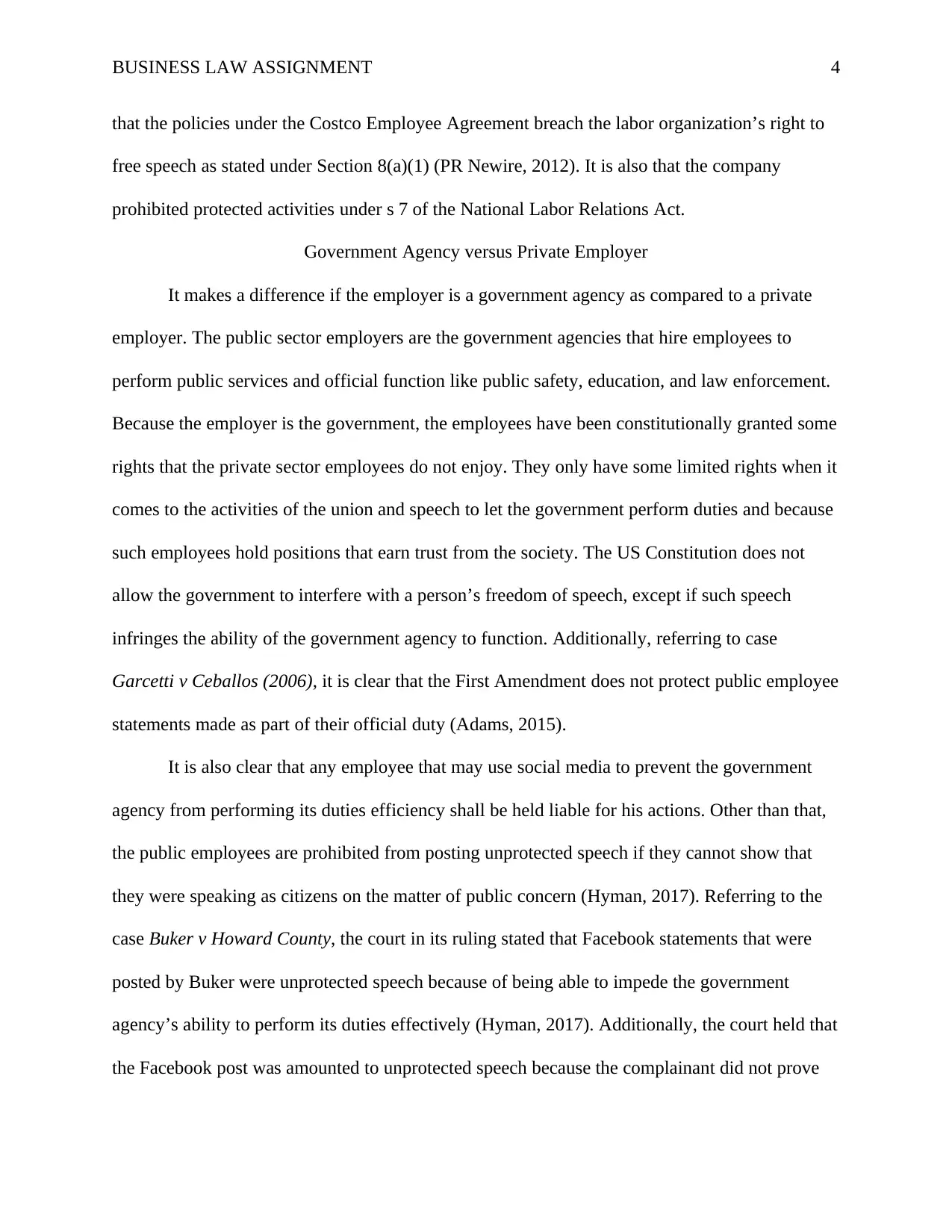
BUSINESS LAW ASSIGNMENT 4
that the policies under the Costco Employee Agreement breach the labor organization’s right to
free speech as stated under Section 8(a)(1) (PR Newire, 2012). It is also that the company
prohibited protected activities under s 7 of the National Labor Relations Act.
Government Agency versus Private Employer
It makes a difference if the employer is a government agency as compared to a private
employer. The public sector employers are the government agencies that hire employees to
perform public services and official function like public safety, education, and law enforcement.
Because the employer is the government, the employees have been constitutionally granted some
rights that the private sector employees do not enjoy. They only have some limited rights when it
comes to the activities of the union and speech to let the government perform duties and because
such employees hold positions that earn trust from the society. The US Constitution does not
allow the government to interfere with a person’s freedom of speech, except if such speech
infringes the ability of the government agency to function. Additionally, referring to case
Garcetti v Ceballos (2006), it is clear that the First Amendment does not protect public employee
statements made as part of their official duty (Adams, 2015).
It is also clear that any employee that may use social media to prevent the government
agency from performing its duties efficiency shall be held liable for his actions. Other than that,
the public employees are prohibited from posting unprotected speech if they cannot show that
they were speaking as citizens on the matter of public concern (Hyman, 2017). Referring to the
case Buker v Howard County, the court in its ruling stated that Facebook statements that were
posted by Buker were unprotected speech because of being able to impede the government
agency’s ability to perform its duties effectively (Hyman, 2017). Additionally, the court held that
the Facebook post was amounted to unprotected speech because the complainant did not prove
that the policies under the Costco Employee Agreement breach the labor organization’s right to
free speech as stated under Section 8(a)(1) (PR Newire, 2012). It is also that the company
prohibited protected activities under s 7 of the National Labor Relations Act.
Government Agency versus Private Employer
It makes a difference if the employer is a government agency as compared to a private
employer. The public sector employers are the government agencies that hire employees to
perform public services and official function like public safety, education, and law enforcement.
Because the employer is the government, the employees have been constitutionally granted some
rights that the private sector employees do not enjoy. They only have some limited rights when it
comes to the activities of the union and speech to let the government perform duties and because
such employees hold positions that earn trust from the society. The US Constitution does not
allow the government to interfere with a person’s freedom of speech, except if such speech
infringes the ability of the government agency to function. Additionally, referring to case
Garcetti v Ceballos (2006), it is clear that the First Amendment does not protect public employee
statements made as part of their official duty (Adams, 2015).
It is also clear that any employee that may use social media to prevent the government
agency from performing its duties efficiency shall be held liable for his actions. Other than that,
the public employees are prohibited from posting unprotected speech if they cannot show that
they were speaking as citizens on the matter of public concern (Hyman, 2017). Referring to the
case Buker v Howard County, the court in its ruling stated that Facebook statements that were
posted by Buker were unprotected speech because of being able to impede the government
agency’s ability to perform its duties effectively (Hyman, 2017). Additionally, the court held that
the Facebook post was amounted to unprotected speech because the complainant did not prove
Paraphrase This Document
Need a fresh take? Get an instant paraphrase of this document with our AI Paraphraser
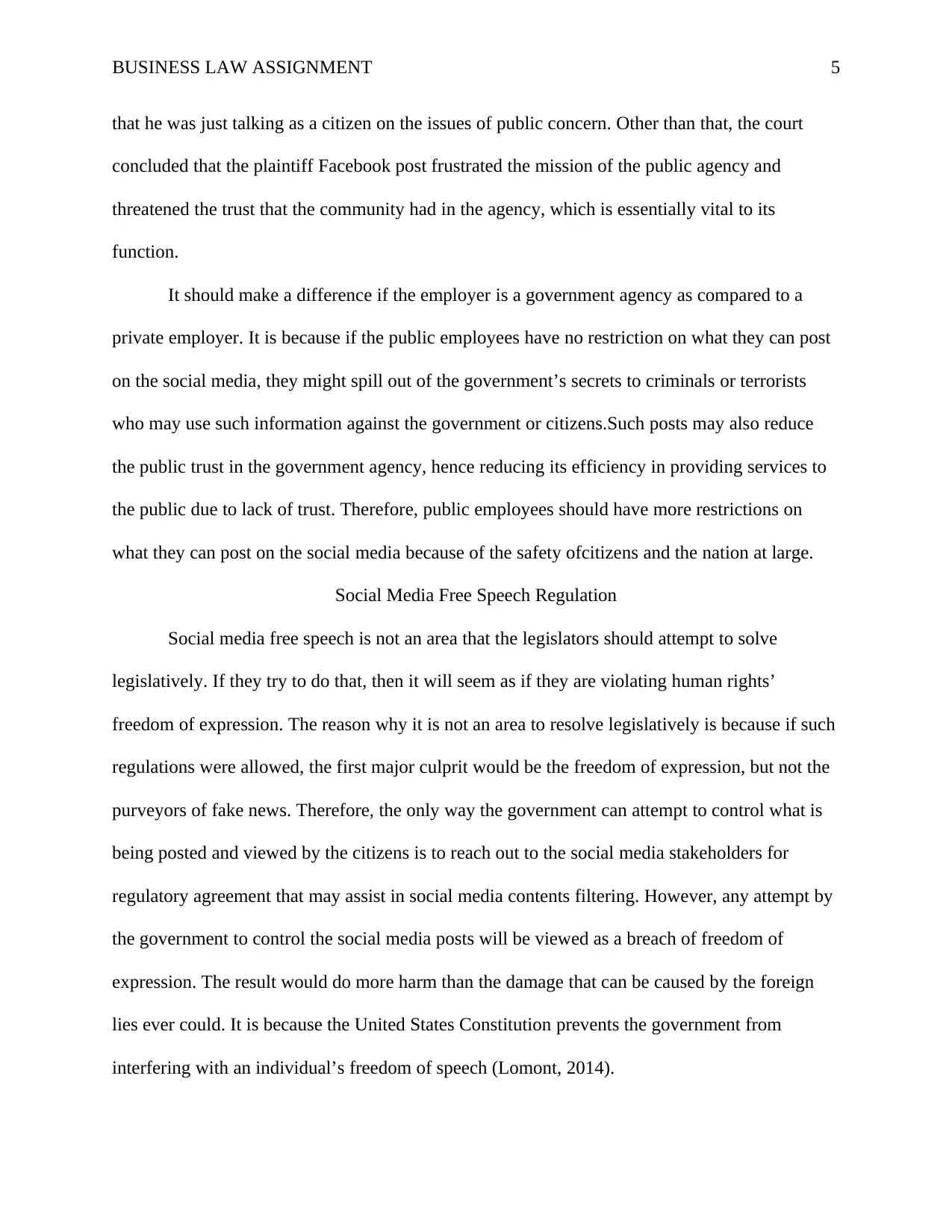
BUSINESS LAW ASSIGNMENT 5
that he was just talking as a citizen on the issues of public concern. Other than that, the court
concluded that the plaintiff Facebook post frustrated the mission of the public agency and
threatened the trust that the community had in the agency, which is essentially vital to its
function.
It should make a difference if the employer is a government agency as compared to a
private employer. It is because if the public employees have no restriction on what they can post
on the social media, they might spill out of the government’s secrets to criminals or terrorists
who may use such information against the government or citizens.Such posts may also reduce
the public trust in the government agency, hence reducing its efficiency in providing services to
the public due to lack of trust. Therefore, public employees should have more restrictions on
what they can post on the social media because of the safety ofcitizens and the nation at large.
Social Media Free Speech Regulation
Social media free speech is not an area that the legislators should attempt to solve
legislatively. If they try to do that, then it will seem as if they are violating human rights’
freedom of expression. The reason why it is not an area to resolve legislatively is because if such
regulations were allowed, the first major culprit would be the freedom of expression, but not the
purveyors of fake news. Therefore, the only way the government can attempt to control what is
being posted and viewed by the citizens is to reach out to the social media stakeholders for
regulatory agreement that may assist in social media contents filtering. However, any attempt by
the government to control the social media posts will be viewed as a breach of freedom of
expression. The result would do more harm than the damage that can be caused by the foreign
lies ever could. It is because the United States Constitution prevents the government from
interfering with an individual’s freedom of speech (Lomont, 2014).
that he was just talking as a citizen on the issues of public concern. Other than that, the court
concluded that the plaintiff Facebook post frustrated the mission of the public agency and
threatened the trust that the community had in the agency, which is essentially vital to its
function.
It should make a difference if the employer is a government agency as compared to a
private employer. It is because if the public employees have no restriction on what they can post
on the social media, they might spill out of the government’s secrets to criminals or terrorists
who may use such information against the government or citizens.Such posts may also reduce
the public trust in the government agency, hence reducing its efficiency in providing services to
the public due to lack of trust. Therefore, public employees should have more restrictions on
what they can post on the social media because of the safety ofcitizens and the nation at large.
Social Media Free Speech Regulation
Social media free speech is not an area that the legislators should attempt to solve
legislatively. If they try to do that, then it will seem as if they are violating human rights’
freedom of expression. The reason why it is not an area to resolve legislatively is because if such
regulations were allowed, the first major culprit would be the freedom of expression, but not the
purveyors of fake news. Therefore, the only way the government can attempt to control what is
being posted and viewed by the citizens is to reach out to the social media stakeholders for
regulatory agreement that may assist in social media contents filtering. However, any attempt by
the government to control the social media posts will be viewed as a breach of freedom of
expression. The result would do more harm than the damage that can be caused by the foreign
lies ever could. It is because the United States Constitution prevents the government from
interfering with an individual’s freedom of speech (Lomont, 2014).
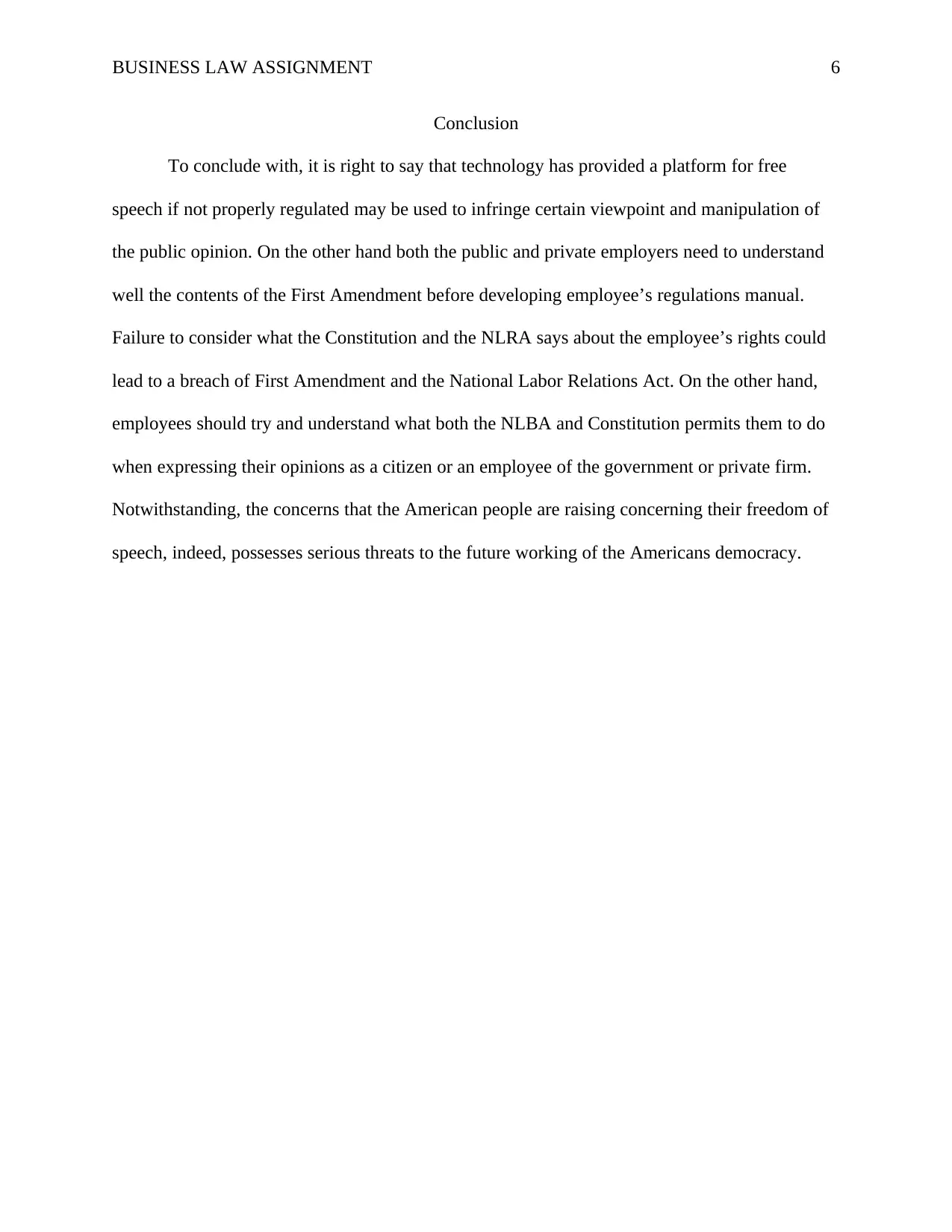
BUSINESS LAW ASSIGNMENT 6
Conclusion
To conclude with, it is right to say that technology has provided a platform for free
speech if not properly regulated may be used to infringe certain viewpoint and manipulation of
the public opinion. On the other hand both the public and private employers need to understand
well the contents of the First Amendment before developing employee’s regulations manual.
Failure to consider what the Constitution and the NLRA says about the employee’s rights could
lead to a breach of First Amendment and the National Labor Relations Act. On the other hand,
employees should try and understand what both the NLBA and Constitution permits them to do
when expressing their opinions as a citizen or an employee of the government or private firm.
Notwithstanding, the concerns that the American people are raising concerning their freedom of
speech, indeed, possesses serious threats to the future working of the Americans democracy.
Conclusion
To conclude with, it is right to say that technology has provided a platform for free
speech if not properly regulated may be used to infringe certain viewpoint and manipulation of
the public opinion. On the other hand both the public and private employers need to understand
well the contents of the First Amendment before developing employee’s regulations manual.
Failure to consider what the Constitution and the NLRA says about the employee’s rights could
lead to a breach of First Amendment and the National Labor Relations Act. On the other hand,
employees should try and understand what both the NLBA and Constitution permits them to do
when expressing their opinions as a citizen or an employee of the government or private firm.
Notwithstanding, the concerns that the American people are raising concerning their freedom of
speech, indeed, possesses serious threats to the future working of the Americans democracy.
⊘ This is a preview!⊘
Do you want full access?
Subscribe today to unlock all pages.

Trusted by 1+ million students worldwide
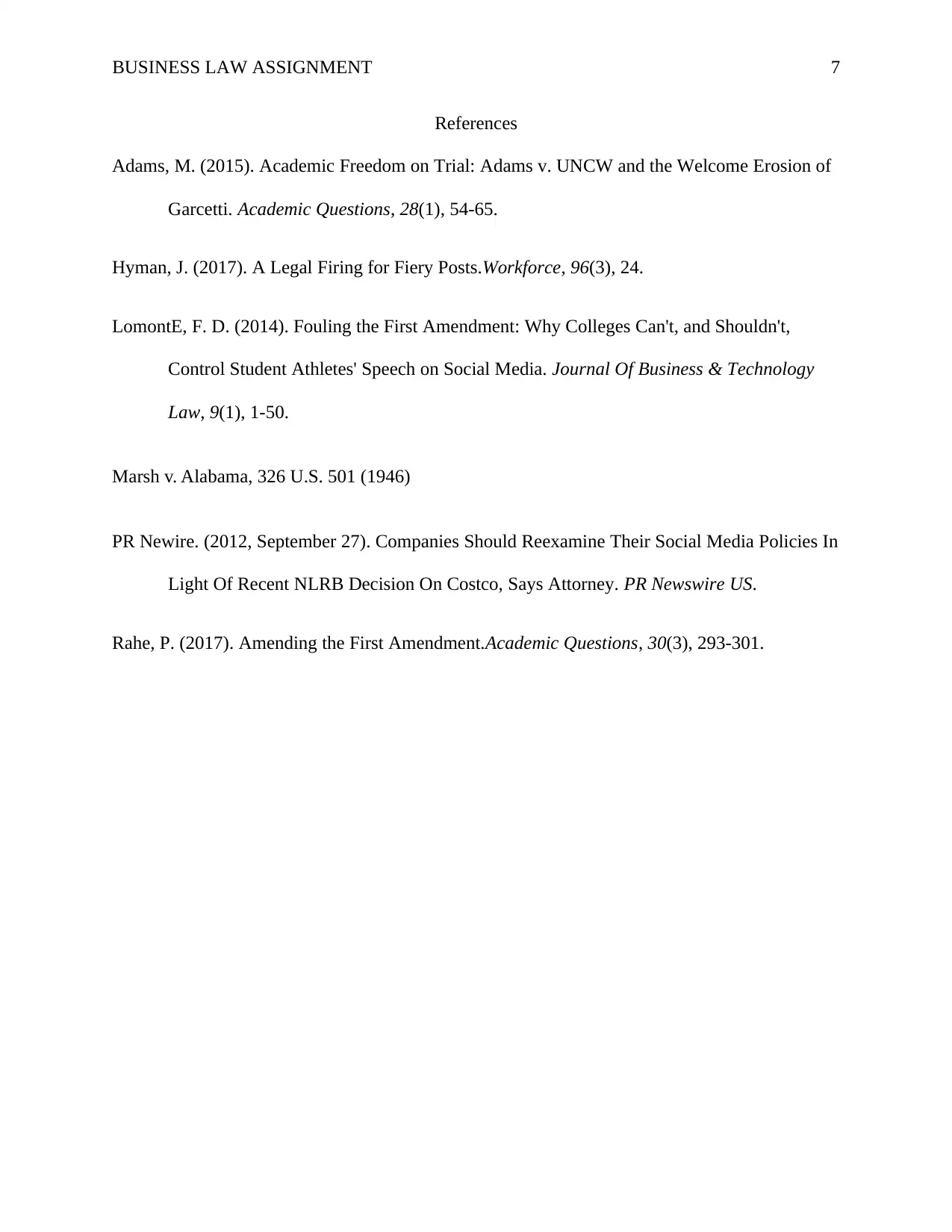
BUSINESS LAW ASSIGNMENT 7
References
Adams, M. (2015). Academic Freedom on Trial: Adams v. UNCW and the Welcome Erosion of
Garcetti. Academic Questions, 28(1), 54-65.
Hyman, J. (2017). A Legal Firing for Fiery Posts.Workforce, 96(3), 24.
LomontE, F. D. (2014). Fouling the First Amendment: Why Colleges Can't, and Shouldn't,
Control Student Athletes' Speech on Social Media. Journal Of Business & Technology
Law, 9(1), 1-50.
Marsh v. Alabama, 326 U.S. 501 (1946)
PR Newire. (2012, September 27). Companies Should Reexamine Their Social Media Policies In
Light Of Recent NLRB Decision On Costco, Says Attorney. PR Newswire US.
Rahe, P. (2017). Amending the First Amendment.Academic Questions, 30(3), 293-301.
References
Adams, M. (2015). Academic Freedom on Trial: Adams v. UNCW and the Welcome Erosion of
Garcetti. Academic Questions, 28(1), 54-65.
Hyman, J. (2017). A Legal Firing for Fiery Posts.Workforce, 96(3), 24.
LomontE, F. D. (2014). Fouling the First Amendment: Why Colleges Can't, and Shouldn't,
Control Student Athletes' Speech on Social Media. Journal Of Business & Technology
Law, 9(1), 1-50.
Marsh v. Alabama, 326 U.S. 501 (1946)
PR Newire. (2012, September 27). Companies Should Reexamine Their Social Media Policies In
Light Of Recent NLRB Decision On Costco, Says Attorney. PR Newswire US.
Rahe, P. (2017). Amending the First Amendment.Academic Questions, 30(3), 293-301.
1 out of 7
Related Documents
Your All-in-One AI-Powered Toolkit for Academic Success.
+13062052269
info@desklib.com
Available 24*7 on WhatsApp / Email
![[object Object]](/_next/static/media/star-bottom.7253800d.svg)
Unlock your academic potential
Copyright © 2020–2026 A2Z Services. All Rights Reserved. Developed and managed by ZUCOL.





